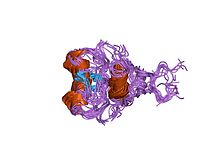GATA zinc finger
| GATA zinc finger | |||||||||
|---|---|---|---|---|---|---|---|---|---|
 zinc fingers as protein recognition motifs: structural basis for the gata-1/friend of gata interaction | |||||||||
| Identifiers | |||||||||
| Symbol | GATA | ||||||||
| Pfam | PF00320 | ||||||||
| Pfam clan | CL0167 | ||||||||
| InterPro | IPR000679 | ||||||||
| PROSITE | PDOC00300 | ||||||||
| SCOP2 | 1gat / SCOPe / SUPFAM | ||||||||
| CDD | cd00202 | ||||||||
| |||||||||
In molecular biology, GATA zinc fingers are zinc-containing domains found in a number of transcription factors (including erythroid-specific transcription factor and nitrogen regulatory proteins). Some members of this class of zinc fingers specifically bind the DNA sequence (A/T)GATA(A/G) in the regulatory regions of genes.,[1] giving rise to the name of the domain. In these domains, a single zinc ion is coordinated by 4 cysteine residues.[2][3] NMR studies have shown the core of the Znf to comprise 2 irregular anti-parallel beta-sheets and an alpha-helix, followed by a long loop to the C-terminal end of the finger. The N-terminal part, which includes the helix, is similar in structure, but not sequence, to the N-terminal zinc module of the glucocorticoid receptor DNA-binding domain. The helix and the loop connecting the 2 beta-sheets interact with the major groove of the DNA, while the C-terminal tail wraps around into the minor groove. Interactions between the Znf and DNA are mainly hydrophobic, explaining the preponderance of thymines in the binding site; a large number of interactions with the phosphate backbone have also been observed.[3] Two GATA zinc fingers are found in GATA-family transcription factors. However, there are several proteins that only contain a single copy of the domain. It is also worth noting that many GATA-type Znfs (such as those found in the proteins GATAD2B and MTA1) have not been experimentally demonstrated to be DNA-binding domains. Furthermore, several GATA-type Znfs have been demonstrated to act as protein-recognition domains. For example, the N-terminal Znf of GATA1 binds specifically to a zinc finger from the transcriptional coregulator FOG1 (ZFPM1).[4]
References
- ^ Yamamoto M, Ko LJ, Leonard MW, Beug H, Orkin SH, Engel JD (October 1990). "Activity and tissue-specific expression of the transcription factor NF-E1 multigene family". Genes Dev. 4 (10): 1650–62. doi:10.1101/gad.4.10.1650. PMID 2249770.
- ^ Evans T, Felsenfeld G (September 1989). "The erythroid-specific transcription factor Eryf1: a new finger protein". Cell. 58 (5): 877–85. doi:10.1016/0092-8674(89)90940-9. PMID 2776214. S2CID 46374550.
- ^ a b Omichinski JG, Clore GM, Schaad O, Felsenfeld G, Trainor C, Appella E, Stahl SJ, Gronenborn AM (July 1993). "NMR structure of a specific DNA complex of Zn-containing DNA binding domain of GATA-1". Science. 261 (5120): 438–46. Bibcode:1993Sci...261..438O. doi:10.1126/science.8332909. PMID 8332909.
- ^ Liew CK, Simpson RJ, Kwan AH, Crofts LA, Loughlin FE, Matthews JM, Crossley M, Mackay JP (March 2005). "Zinc fingers as protein recognition motifs: structural basis for the GATA-1/friend of GATA interaction". PNAS USA. 102 (3): 583–8. Bibcode:2005PNAS..102..583L. doi:10.1073/pnas.0407511102. PMC 545545. PMID 15644435.